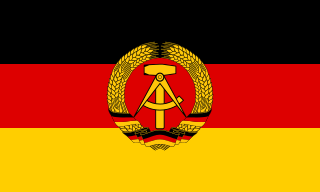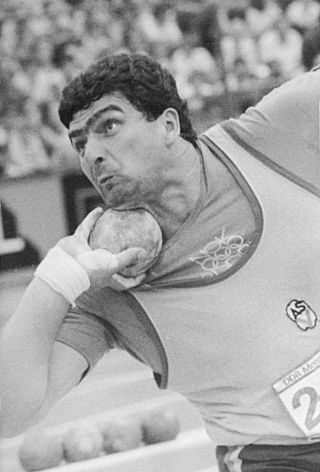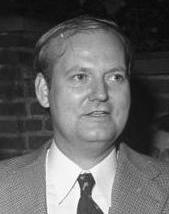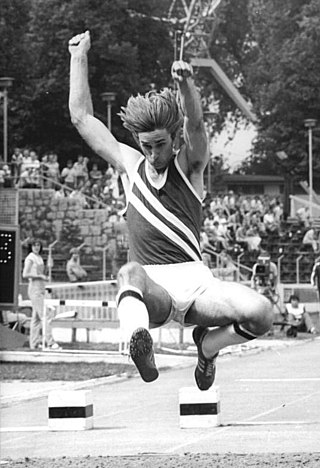
The Berlin Wall was a guarded concrete barrier that encircled West Berlin of the Federal Republic of Germany (FRG) from 1961 to 1989, separating it from East Berlin and the German Democratic Republic (GDR). Construction of the Berlin Wall was commenced by the government of the GDR on 13 August 1961. It included guard towers placed along large concrete walls, accompanied by a wide area that contained anti-vehicle trenches, beds of nails and other defenses. The primary intention for the Wall's construction was to prevent East German citizens from fleeing to the West.

East Berlin was the de facto capital city of East Germany (GDR) from 1949 to 1990. Formally, it was the Soviet sector of Berlin, established in 1945. The American, British, and French sectors were known as West Berlin. From 13 August 1961 until 9 November 1989, East Berlin was separated from West Berlin by the Berlin Wall. The Western Allied powers did not recognize East Berlin as the GDR's capital, nor the GDR's authority to govern East Berlin. On 3 October 1990, the day Germany was officially reunified, East and West Berlin formally reunited as the city of Berlin.

East Germany, officially the German Democratic Republic, was a country in Central Europe that existed from its creation on 7 October 1949 until its dissolution on 3 October 1990. Until 1989, it was commonly viewed as a communist state, and it described itself as a socialist "workers' and peasants' state". Before the establishment, its territory was administered and occupied by Soviet forces with the autonomy of the native communists following the Berlin Declaration abolishing German sovereignty in World War II; when the Potsdam Agreement established the Soviet-occupied zone, bounded on the east by the Oder–Neisse line. The GDR was dominated by the Socialist Unity Party of Germany (SED) a communist party from 1949 to 1989 before being democratized and liberalized under the impact of the Revolutions of 1989 against the communist states, helping East Germany be united with the West. Unlike West Germany, SED did not see its state as the successor one of the German Reich (1871–1945) and abolished the goal of unification in the constitution (1974). Under the SED rule, GDR was often judged as a Soviet satellite state; most scholars and academics described it as a totalitarian and repressive regime.

Erich Ernst Paul Honecker was a German communist politician who led the German Democratic Republic from 1971 until shortly before the fall of the Berlin Wall in November 1989. He held the posts of General Secretary of the Socialist Unity Party of Germany (SED) and Chairman of the National Defence Council; in 1976, he replaced Willi Stoph as Chairman of the State Council, the official head of state. As the leader of East Germany, Honecker was viewed as a dictator. During his leadership, the country had close ties to the Soviet Union, which maintained a large army in the country.

German reunification was the process of re-establishing Germany as a single full sovereign state, which took place between 9 November 1989 and 15 March 1991. The day of 3 October 1990 when the "Unification Treaty" entered into force dissolving the German Democratic Republic and integrating its recently re-established constituent federated states into the Federal Republic of Germany to form present-day Germany, has been chosen as the customary German Unity Day and has thereafter been celebrated each year as a national holiday in Germany since 1991. As part of the reunification, East and West Berlin of the two countries were also de facto united into a single city; which later eventually became the capital of this country.

The 1980 Summer Olympics, officially known as the Games of the XXII Olympiad and commonly known as Moscow 1980, were an international multi-sport event held from 19 July to 3 August 1980 in Moscow, Soviet Union, in present-day Russia. The games were the first to be staged in an Eastern Bloc country, as well as the first Olympic Games and only Summer Olympics to be held in a Slavic language-speaking country. They were also the only Summer Olympic Games to be held in a self-proclaimed communist country until the 2008 Summer Olympics held in China. These were the final Olympic Games under the IOC Presidency of Michael Morris, 3rd Baron Killanin before he was succeeded by Juan Antonio Samaranch, a Spaniard, shortly afterwards.

Walter Scheel was a German statesman. A member of the Free Democratic Party of Germany (FDP), he first served in government as the Federal Minister of Economic Cooperation and Development from 1961 to 1966 and later as President of Germany from 1974 to 1979. He led the FDP from 1968 to 1974.

The Peaceful Revolution, as a part of the Revolutions of 1989, was the process of sociopolitical change that led to the opening of East Germany's borders with the West, the end of the ruling of the Socialist Unity Party of Germany (SED) in the German Democratic Republic in 1989 and the transition to a parliamentary democracy, which later enabled the reunification of Germany in October 1990. This happened through non-violent initiatives and demonstrations. This period of change is referred to in German as Die Wende.

The Battle of Amiens, also known as the Third Battle of Picardy, was the opening phase of the Allied offensive which began on 8 August 1918, later known as the Hundred Days Offensive, that ultimately led to the end of the First World War. Allied forces advanced over 11 kilometres (7 mi) on the first day, one of the greatest advances of the war, with Gen Henry Rawlinson's British Fourth Army and Gen Marie Eugène Debeney's French First Army playing the decisive role. The battle is also notable for its effects on both sides' morale and the large number of surrendering German forces. This led Erich Ludendorff to later describe the first day of the battle as "the black day of the German Army". Amiens was one of the first major battles involving armoured warfare.

Günther Maleuda was an East German politician. From November 1989 to April 1990 he was the President of the People's Chamber.

Sportgemeinschaft Dynamo Dresden e.V., commonly known as SG Dynamo Dresden or Dynamo Dresden, is a German association football club based in Dresden, Saxony. They were founded on 12 April 1953 as a club affiliated with the East German police and became one of the most popular and successful clubs in East German football, winning eight league titles.

Klaus von Dohnanyi is a German politician of the Social Democratic Party (SPD). He served as mayor of Hamburg between 1981 and 1988.

Udo Beyer is a former East German track and field athlete who competed in the shot put. Beyer has admitted to knowingly taking part in doping while he competed for East Germany. He was a Stasi informer under the codename "Kapitän".

Hans-Jürgen "Dixie" Dörner was a German football player and coach. He distinguished himself during his career by being named East Germany's player of the year three times – the only East German player to do this besides goalkeeper Jürgen Croy.

Dietrich Stobbe was a German politician who served as the Mayor of West Berlin from 1977 to 1981, as a member of the Social Democratic Party (SPD). Stobbe also served as President of the Bundesrat from 1 November 1978 to 31 October 1979.
Bernhard Germeshausen was an East German bobsledder who competed from the mid-1970s to the early 1980s. Competing in two Winter Olympics, he won four medals with three golds and one silver.

Henry Lauterbach is a retired East German high jumper and long jumper.

The Germany national water polo team represents Germany in international men's water polo competitions and friendly matches. It is controlled by German Swimming Federation.

Vera Lengsfeld is a German politician. She was a prominent civil rights activist in East Germany and after the German reunification she first represented the Alliance 90/The Greens and then the German Christian Democratic Union (CDU) in the Bundestag.

The Polish crisis of 1980–1981, associated with the emergence of the Solidarity mass movement in the Polish People's Republic, challenged the rule of the Polish United Workers' Party and Poland's alignment with the Soviet Union.



















